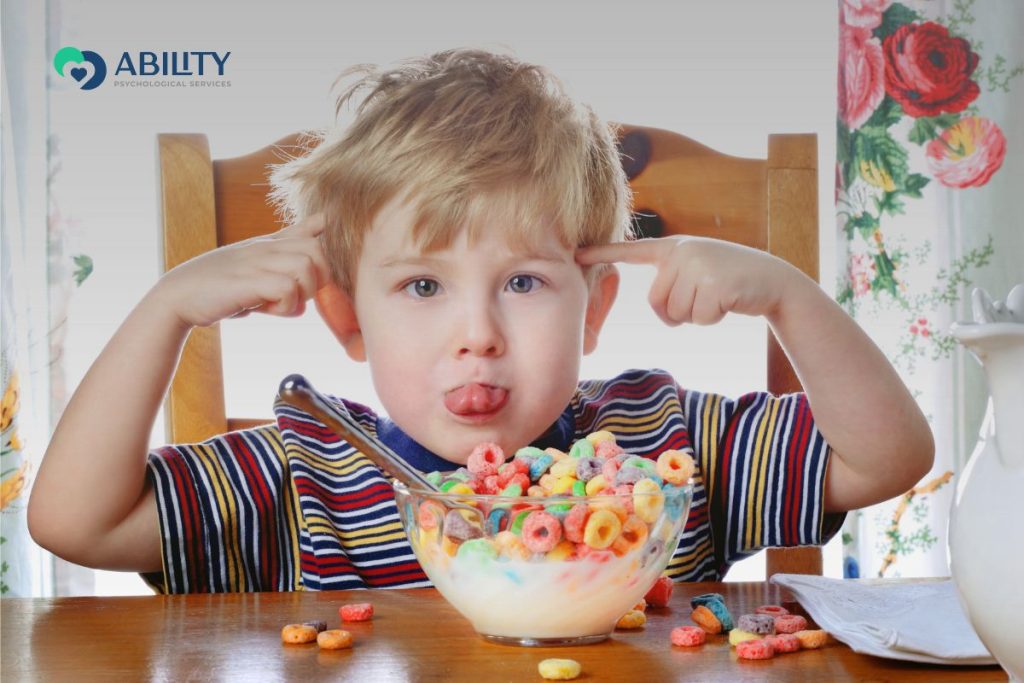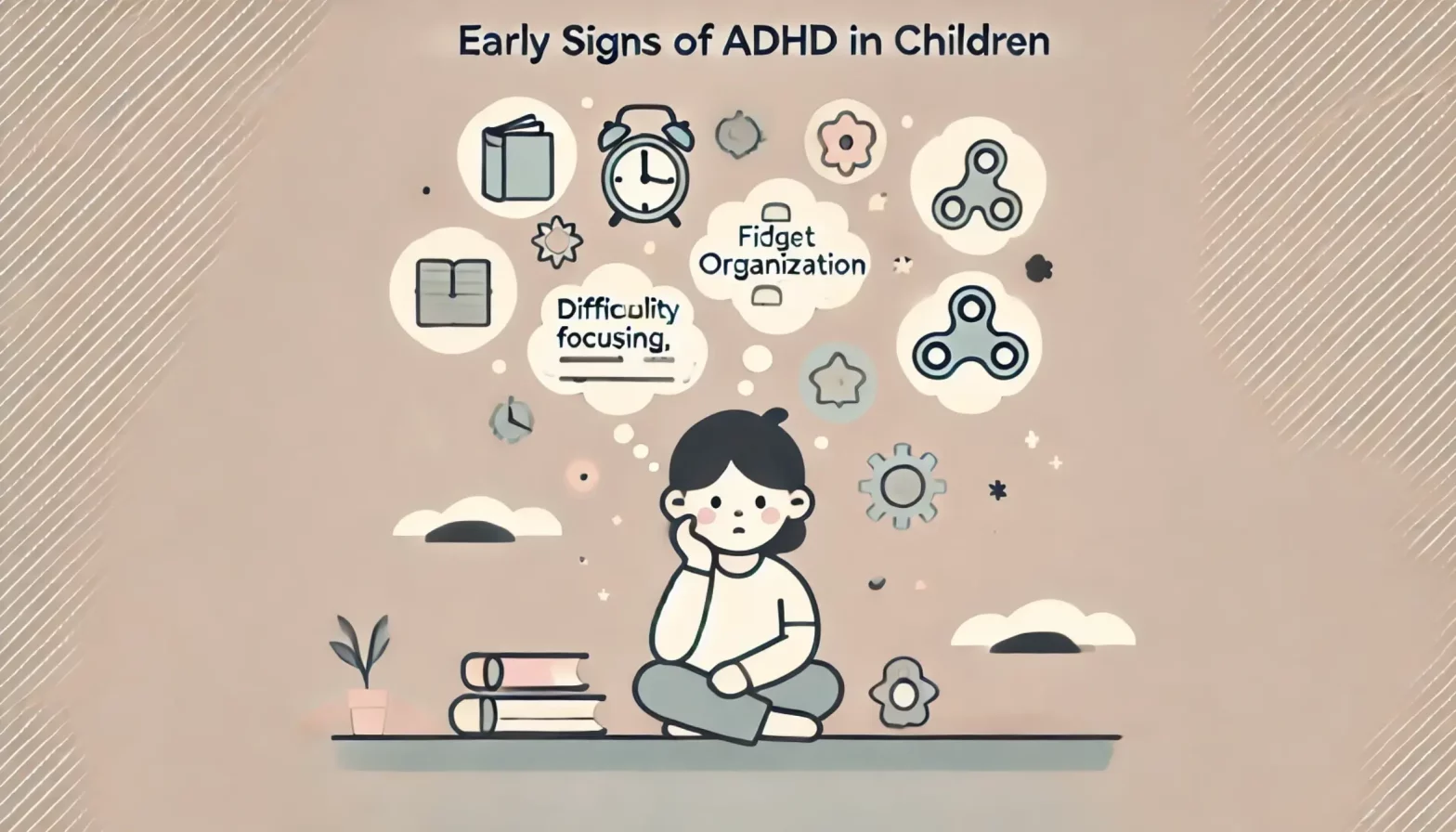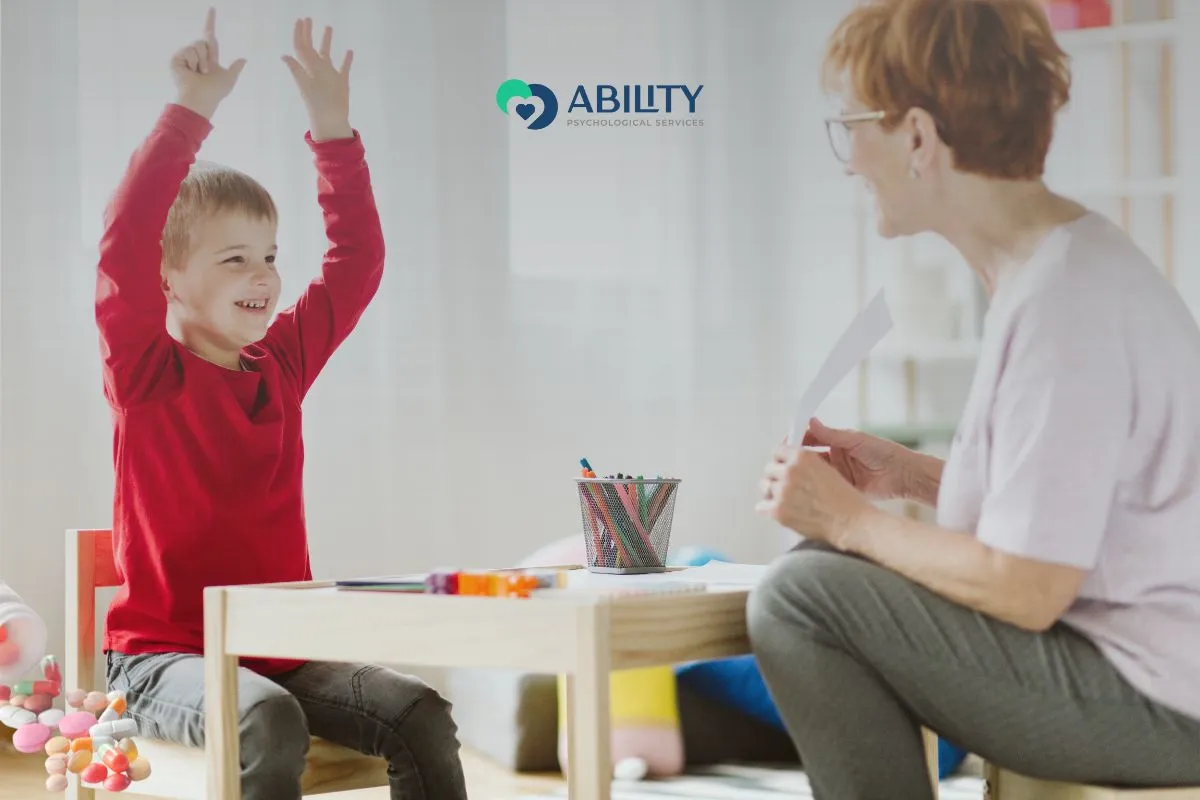Early Signs of ADHD in Children – What Oakland Parents Should Know
Attention-Deficit/Hyperactivity Disorder (ADHD) is one of the most common neurodevelopmental disorders in children. Understanding the early signs can lead to earlier interventions, helping children thrive in their social and academic lives. For parents and caregivers, knowing how ADHD presents itself is crucial to ensure timely action and support.
What is ADHD?
ADHD is a complex brain-based disorder that affects a child’s ability to focus, control impulses, and maintain attention. It’s not merely a behavioral issue but a neurological condition that influences many aspects of daily life, including learning, relationships, and emotional well-being. Children with ADHD might struggle with paying attention, sitting still, or controlling their behavior.
ADHD Affects the Brain Differently
ADHD alters how certain brain networks function, particularly those that control attention and executive functioning. These changes result in difficulties staying focused, regulating impulses, and staying organized. For parents, understanding that ADHD is a medical condition — not a character flaw — can lead to better support for their child.
Common Misconceptions About ADHD
There are many misconceptions about ADHD. One common myth is that ADHD is just about hyperactivity. However, many children with ADHD may struggle with inattention rather than physical hyperactivity. Additionally, ADHD is often misunderstood as a result of poor discipline or bad parenting, which is not the case.
According to the Centers for Disease Control and Prevention (CDC), ADHD is a real medical condition that affects around 6 million children in the U.S. alone (CDC).
How ADHD Affects Children Differently Than Adults
Children with ADHD often struggle with challenges in environments that require structured attention, such as school. In contrast, adults may exhibit signs of disorganization or chronic lateness. While ADHD impacts both children and adults, its presentation often changes with age, and the effects can be more pronounced in a child’s academic and social environment.
Types of ADHD
ADHD is divided into three types, each defined by specific behavioral symptoms.
Hyperactive-Impulsive Type
Children with hyperactive-impulsive ADHD are typically restless and fidgety. They may interrupt conversations or have difficulty waiting their turn. This type is often noticed early because of the obvious physical energy that comes with hyperactivity. These children may also act impulsively, leading to risk-taking behaviors without considering the consequences.
Inattentive Type (Also Known as ADD)
Children with inattentive ADHD may not be hyperactive but instead struggle with focus. These children can appear distracted or forgetful and may frequently daydream. Teachers or parents may notice that they have difficulty following directions or completing tasks. They might lose items, forget assignments, or seem not to listen when spoken to directly.
Combined Type
Combined type ADHD includes symptoms of both inattentiveness and hyperactivity. This is the most common type of ADHD and requires a careful assessment to identify the range of symptoms present. Children with combined type ADHD can be forgetful and easily distracted, while also being hyperactive and impulsive.
Early Signs of ADHD in Children
Early signs of ADHD may manifest in several ways, especially before a child reaches school age. These signs might vary based on the child’s environment and personality, but common behaviors often include:
- Difficulty staying focused on tasks
- Frequently forgetting important daily activities
- Excessive fidgeting or difficulty sitting still
- Impulsive actions without considering consequences
- Struggling to follow directions or finish tasks
- Easily distracted by their surroundings
- Interrupting others’ conversations or activities
- Poor time management and difficulty adhering to routines
Difficulty Staying Focused
One of the earliest signs of ADHD in children is an inability to maintain focus. Whether during play or more structured activities, they may quickly lose interest or become easily distracted.
Impulsive Behavior Without Thinking
Children with ADHD often act without considering the results of their actions. For example, they may interrupt a classmate in school or take toys from others without asking. Impulsiveness can also manifest in difficulty waiting their turn in games or conversations.
Trouble Following Instructions or Completing Tasks
Completing multi-step tasks can be a significant challenge for children with ADHD. They may start one activity but leave it incomplete to begin something else. This behavior can make schoolwork and household responsibilities particularly difficult for both the child and the family.
Signs of ADHD in Toddlers

While ADHD is usually diagnosed during early school years, signs can begin to show even in toddlers. However, these signs may be subtler or mistaken for normal toddler behavior.
Hyperactivity in Young Children
Very young children with ADHD may have trouble playing quietly. They might be in constant motion, running or climbing in situations where it’s inappropriate. Toddlers with ADHD may also be more likely to act out or throw tantrums because they lack the ability to regulate their emotions effectively.
Inability to Play Quietly
Toddlers with ADHD are often loud or disruptive during play. They may not enjoy calm activities like reading or sitting still to watch a movie.
Frequent Temper Tantrums and Impatience
ADHD can lead to extreme impatience, especially in younger children. Tantrums may occur more frequently or escalate quickly because the child struggles with managing emotions and waiting.
Behavioral Signs in School-Aged Children
As children with ADHD enter school, their struggles with behavior and academics often become more evident.
Struggling in School Academically
A child with ADHD may perform below their potential because they have difficulty staying on task or following through with assignments. Teachers may note that the child is frequently off-task or distracted.
Difficulty Forming Friendships
Making and maintaining friendships can be tough for children with ADHD. Impulsive behaviors and difficulty understanding social cues can make it hard for these children to interact appropriately with peers. They may be perceived as overly aggressive or disruptive, leading to conflicts.
Frequent Outbursts in Class
Children with ADHD often have difficulty managing frustration, leading to emotional outbursts in the classroom. These outbursts may be triggered by small challenges, such as a difficult homework problem or being asked to sit still for extended periods.
ADHD and Academic Challenges
Oakland Unified School District (OUSD) and local charter schools offer various support programs for children with ADHD. However, the effectiveness of these programs can vary. Many children with ADHD may qualify for Individualized Education Programs (IEPs) or 504 Plans, which provide accommodations such as extra time on tests, preferential seating, and structured breaks. If you’re a parent navigating this process, connecting with local advocacy groups or special education consultants can be beneficial.
ADHD and learning disabilities often overlap, making academic challenges even more complex. Learn more about this connection in our blog, Exploring the Connection Between ADHD and Learning Disabilities.
ADHD can severely impact a child’s academic performance. Children with ADHD might be capable of performing well academically, but their symptoms often hinder their progress.
Inability to Stay on Task
A child with ADHD may start tasks but leave them unfinished. This can make completing homework or classroom assignments particularly challenging. Teachers may notice that the child moves from one activity to another without finishing anything.
Disorganization with Schoolwork and Materials
Disorganization is a hallmark of ADHD. Children might lose track of their homework, forget to bring necessary materials to school, or have trouble keeping their school supplies organized.
Forgetting to Turn in Assignments
Even when a child completes an assignment, they may forget to turn it in. This forgetfulness can be frustrating for both teachers and parents and can impact the child’s grades.
If your child is experiencing academic difficulties, it’s helpful to learn how to advocate for your child’s rights at school, so they receive the supports they need.
Emotional and Social Impact
ADHD doesn’t just affect a child academically; it can also influence their emotional health and social relationships.
Low Self-Esteem
Children with ADHD may struggle with self-esteem issues due to their ongoing difficulties at school and with friends. They may feel as though they are constantly in trouble or failing, leading to a poor self-image.
Frequent Mood Swings
Mood swings are common in children with ADHD, especially if they feel frustrated or overwhelmed by their inability to focus or complete tasks. These emotional shifts can make it difficult for them to maintain stable relationships with others.
Frustration with Peers or Feeling Isolated
Children with ADHD may feel isolated from their peers because of their differences in behavior. They might experience frustration when they can’t keep up with conversations or social games, leading to a sense of isolation.
How ADHD Affects Family Dynamics
ADHD can also affect a child’s family, often creating tension and stress at home.
Increased Tension at Home
The impulsive and hyperactive behaviors associated with ADHD can create stress for parents and siblings. Frequent emotional outbursts or difficulty following rules can lead to tension, misunderstandings, and frustration.
Siblings Feeling Overlooked
Siblings of children with ADHD might feel neglected, especially when parents focus a lot of their attention on managing the ADHD child’s behavior. This can lead to jealousy or sibling rivalry.
Parents Feeling Overwhelmed
Managing a child with ADHD can be challenging for parents. The constant need to redirect, remind, and assist the child may lead to feelings of frustration or burnout. It’s important for parents to seek support when needed to help manage the stress that comes with raising a child with ADHD.
When Should Parents Be Concerned?
There is a difference between typical childhood behavior and ADHD. Every child will have moments of impulsivity or inattentiveness, but persistent patterns of behavior that interfere with daily life may indicate ADHD.
Normal vs. Concerning Behaviors
It’s normal for children to be energetic, forgetful, or easily distracted at times. However, if these behaviors are excessive and occur across different environments (home, school, social settings), it may be time to seek professional help.
Importance of Early Diagnosis
An early diagnosis of ADHD can make a significant difference. The earlier the condition is diagnosed, the sooner interventions such as therapy or behavior management strategies can begin. This early intervention can lead to improved outcomes for the child’s education, relationships, and emotional health.
How ADHD is Diagnosed
Diagnosing ADHD is a comprehensive process involving input from various sources, including parents, teachers, and healthcare professionals. A thorough neurodevelopmental evaluation can provide deeper insights into a child’s cognitive and behavioral patterns.
Role of Doctors and Specialists
Pediatricians or child psychologists are often the first point of contact when ADHD is suspected. They may ask parents and teachers to complete behavior rating scales or observe the child in different environments.
Tests and Evaluations
There is no single test for ADHD. Instead, professionals rely on a variety of assessments, including interviews, questionnaires, and observations. These evaluations help rule out other potential causes for the child’s behavior.
Parent and Teacher Observations
Parental and teacher input is crucial in diagnosing ADHD. A child’s behavior may vary between home and school, so gathering information from both environments is essential for an accurate diagnosis.
Treatment Options for ADHD in Children
There is no one-size-fits-all treatment for ADHD, but a combination of therapy, medication, and lifestyle changes is often effective.
Behavioral Therapy
Behavioral therapy helps children develop skills to manage their symptoms. It focuses on creating positive behaviors, improving focus, and reducing impulsive actions.
Medication
In some cases, doctors may prescribe stimulant or non-stimulant medications to help improve focus and reduce hyperactivity. These medications are carefully monitored to ensure they are helping the child without significant side effects.
Lifestyle and Environmental Changes
Simple changes, such as establishing clear routines or reducing distractions, can significantly help children with ADHD manage their symptoms. Parents may work with teachers to create structured environments where their child can thrive.
Tips for Parents of Children with ADHD
Parents play a critical role in helping their child manage ADHD. Here are a few strategies to consider:
Encouraging Routines and Structure
Children with ADHD often do better with consistent routines. Having set times for activities such as homework, meals, and bedtime can help minimize confusion and stress.
Providing Positive Reinforcement
Praising positive behaviors, rather than focusing on negative ones, can encourage children with ADHD to continue their efforts. Small rewards for completing tasks or behaving well can be motivating.
Collaborating with Teachers and Caregivers
Close collaboration between parents, teachers, and other caregivers is essential. By working together, you can ensure that strategies for managing ADHD are consistently applied in all areas of the child’s life.
Myths and Misconceptions about ADHD
There are many myths surrounding ADHD that can create confusion for parents. It’s important to separate facts from misconceptions.
Myth: ADHD is Caused by Bad Parenting
This is a common misconception. ADHD is a neurological disorder and is not caused by parenting styles. While parenting approaches can influence behavior, ADHD is a medical condition that requires professional management.
Myth: Children Will “Grow Out” of ADHD
While some children’s symptoms may improve with age, many continue to experience challenges into adulthood. It’s important to provide ongoing support rather than waiting for a child to “grow out” of it.
When to Reach Out for Professional Help – Contact Ability Psychological Services in Oakland, CA
If you believe your child may be showing signs of ADHD, seeking professional help early is important. At Ability Psychological Services, we specialize in comprehensive ADHD assessments and personalized treatment plans. Early evaluation can lead to better outcomes, giving your child the tools they need to succeed.
Our team works closely with families to understand each child’s unique needs and develop a personalized plan that helps them thrive. From diagnostic evaluations to ongoing therapy, we are here to support your family every step of the way.
Conclusion
Recognizing the early signs of ADHD can be a crucial step in helping your child succeed both academically and socially. Early intervention and support can make a significant difference in managing ADHD symptoms. If you suspect your child may have ADHD, reach out to Ability Psychological Services for a comprehensive evaluation.
Contact Ability Psychological Services today for an ADHD evaluation. Early intervention is the key to your child’s success.





